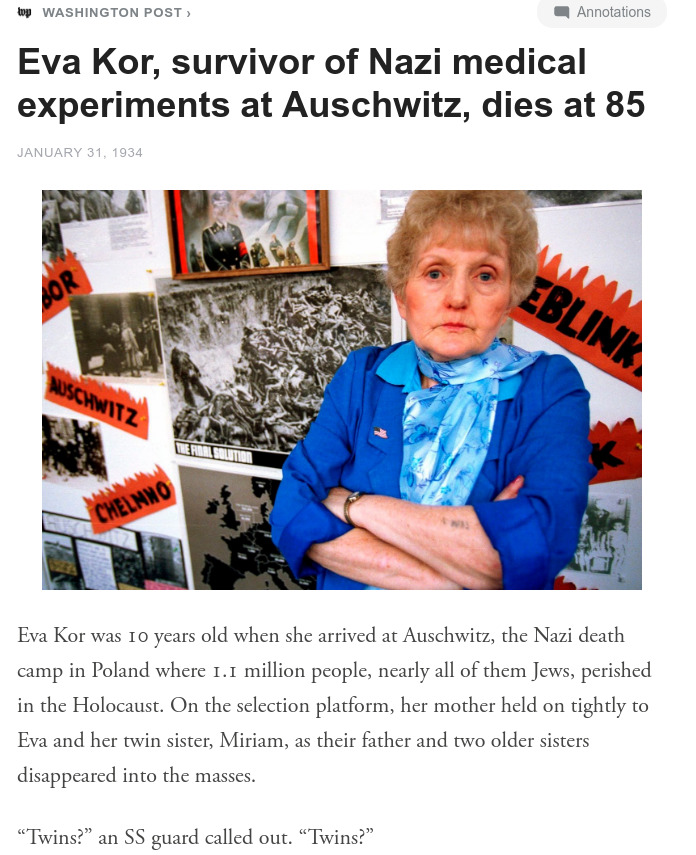R.I.P. Eva Kor, who expanded compassion, empathy, and forgiveness
I just learned that Eva Kor died. Her story in the movie Forgiving Dr. Mengele expanded empathy and forgiveness for me.
Decades after recovering from Nazi torture in Auschwitz under “Doctor” Mengele, she returned, as shown in the documentary. She learned that harboring anger didn’t improve her life, so chose to forgive the Nazis, including Dr. Mengele.
Many people speak of turning the other cheek, loving their enemies, or similar strategies but only in principle. People say, “anger is like drinking poison expecting the other person to die,” yet remain angry, somehow not digesting the words they haughtily show their would-be virtue.
Ms. Kor did so in practice. Beyond others’ inability to do what she did, they attacked her.
She enables me to see a level of emotional skill I can practice I might not have imagined. Though I also see that doing what others say they value but don’t do results in misunderstandings and attacks from them.
As the Washington Post obituary read:
Mrs. Kor returned to Auschwitz for the first time in 1985. A decade later, on the 50th anniversary of the liberation, she visited the camp with Hans Münch, a former Nazi doctor who agreed to offer a testimony of what had transpired at the camp. In an emotional ceremony, Mrs. Kor announced that she forgave the Nazis.

“It was a life-changing experience,†she later said. “I realized I had power over my life. I had the power to heal the pain imposed on me in Auschwitz by forgiving the people who imposed that pain.â€
Critics argued that it was not Mrs. Kor’s place to offer such a pardon and that perhaps none was even possible. She emphasized that she spoke only for herself and that forgiveness was for her benefit, not for that of the Nazis.
In 2015, Mrs. Kor appeared in Germany at the trial of 93-year-old Oskar Groening, a Nazi official dubbed the “bookkeeper of Auschwitz†who was charged with 300,000 counts of accessory to murder for his part in the operation of the camp. Even as she testified against him, she called for him not to be imprisoned, but rather for him to speak to youths about the tragedy of Nazism. They hugged, and she received a kiss from him on the cheek.
Other survivors who acted as plaintiffs in the case angrily distanced themselves from Mrs. Kor’s actions, saying in a statement that “we cannot forgive Mr. Groening his participation in the murder of our relatives and another 299,000 people — especially since he feels free from any legal guilt.â€
Or, according to an IMDB review of the documentary:
Eva becomes a personal hero. What could have been another grotesque documentary about the horrific offenses of the Holocaust, becomes a graceful and incredibly smart analysis of humanity. Eva, this tiny 60 year old lady, with her head hanging off one shoulder, comes out and says she forgives the Nazis, and Dr. Mengele.
Big deal, right? It becomes quite a big deal. Other holocaust survivors, other Mengele twin victims come out to publicly criticize Eva. The body of the film investigates forgiveness- whether Eva genuinely forgave Dr. Mengele or not (I don’t think it would be humanly possible to do when he was responsible for killing her entire family) doesn’t matter as much as what it means to everyone else. The word forgive comes with this acidic and powerful bang, it opened the flood gates of criticism from the Jewish community.
“We are not Gods, we can not forgive.” “To forgive would be to betray our parents.” “It is not my place to forgive.”
I had never heard of anyone using these excuses before, much less believing them. I realized that forgiveness is emphasized in the New Testament and in my upbringing. Perhaps in the Jewish community it means something different, perhaps they don’t see it as a virtue at all . . . and that seems totally bizarre to me.
I recommend watching the documentary and at least reading the obituary. Eva’s experience enables us to see the limits of human compassion, empathy, and forgiveness.
I believe I can practice more empathy, compassion, and forgiveness than before I learned her story.
Read my weekly newsletter

On initiative, leadership, the environment, and burpees